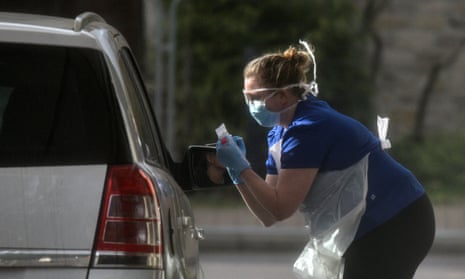The UK government is to trial routine weekly Covid testing of the population as part of preparations to head off a possible winter second wave, as the former health secretary Jeremy Hunt called for such tests to become the norm.
Matt Hancock said the government was committing an extra £500m to scale up testing capacity and launch community pilots trialling the effectiveness of repeat testing in schools and colleges, as well as in the population as a whole. It will also ramp up the trials of a new test kit that it is claimed can provide results within 20 minutes.
The boldest measure will be a new community-wide trial in Salford, launching imminently, to assess the benefits of repeat population testing. Initially, the pilot will focus on a specific high-footfall location in the city with retail, public services, transport and faith spaces.
Hunt, who now chairs the health select committee, said the UK should embrace mass population testing. “I would really want to expand the whole testing programme so we can almost get to a point where we are testing the whole population every week,” he said.
“As an intermediate step I’d want to have expanded it by now so that we’re at least testing all NHS staff and all teachers every week, so people can be absolutely confident when they’re using hospitals, when they’re sending their kids to school, that they are coronavirus-free zones,” he said.
“I think this mass testing could potentially be linked to an app on your phone so that you could show people on your phone the last time you got tested.”
Hunt said mass testing was the key tool against the virus before a vaccine was developed. “In fact, if you had population testing there’s no reason why you, theoretically, would need to have social distancing: you could pretty much carry on life as normal because you’d just know that everyone you’d mix with had been tested very, very recently,” he told ITV’s Acting Prime Minister podcast.
The government is also expanding other testing trials, including a pilot of the rapid 20-minute test in Hampshire as part of mobile testing in different settings.
In Southampton, the second phase of the pilot will trial the weekly testing at the University of Southampton and four Southampton schools. More than 2,100 pupils and staff across four schools will be invited to have a test.
Hancock said testing was “a vital line of defence” and the government had to keep innovating to tackle the pandemic. “We need to use every new innovation at our disposal to expand the use of testing, and build the mass testing capability that can help suppress the virus and enable more of the things that make life worth living,” he said.
Almost 10,000 people took part in the first phase of the Southampton pilot, where GP staff, other essential key workers, university employees and members of their households were sent tests to their home or place of work and completed them by putting saliva in a pot.
The Department of Health and Social Care said the pilot showed the at-home saliva sampling kit was reliable for large-scale, regular testing.
The government has previously rejected calls for routine testing to become the norm in schools, including from Anne Longfield, the children’s commissioner.
The schools minister, Nick Gibb, said last month there were no plans to test pupils and teachers without symptoms. “The advice that we have is that it’s better to test when people actually show symptoms,” he said.
